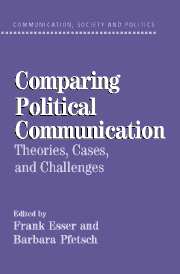Book contents
- Frontmatter
- Contents
- Contributors
- Comparing Political Communication
- INTRODUCTION
- I THEORIES AND METHODS
- II CASES
- III PERSPECTIVES AND CHALLENGES
- 14 State of the Art of Comparative Political Communication Research: Poised for Maturity?
- 15 From Political Culture to Political Communications Culture: A Theoretical Approach to Comparative Analysis
- 16 Problems of Comparative Political Communication Research: Culture as a Key Variable
- 17 Meeting the Challenges of Global Communication and Political Integration: The Significance of Comparative Research in a Changing World
- Author Index
- Subject Index
- References
15 - From Political Culture to Political Communications Culture: A Theoretical Approach to Comparative Analysis
Published online by Cambridge University Press: 24 November 2009
- Frontmatter
- Contents
- Contributors
- Comparing Political Communication
- INTRODUCTION
- I THEORIES AND METHODS
- II CASES
- III PERSPECTIVES AND CHALLENGES
- 14 State of the Art of Comparative Political Communication Research: Poised for Maturity?
- 15 From Political Culture to Political Communications Culture: A Theoretical Approach to Comparative Analysis
- 16 Problems of Comparative Political Communication Research: Culture as a Key Variable
- 17 Meeting the Challenges of Global Communication and Political Integration: The Significance of Comparative Research in a Changing World
- Author Index
- Subject Index
- References
Summary
The scholarly debate on the development of political communication in modern democracies makes reference to concepts of Americanization, modernization, and globalization (Chapter 2, in this volume). The framing of political communication in connection with macropolitical economic and societal processes of change raises the question of the convergence of political communication processes, which elicits ambivalent answers depending on the level of analysis, the point in time, the country, and the cultural context. While one can best speak of convergence in electoral campaign communication, the issue of parallel development tendencies in other areas of political communication still largely remains to be investigated. This is because, firstly, we have neither convincing theoretical concepts nor a comprehensive body of empirical studies on the processes of everyday political communication between elections, communication between government and citizens, or interaction between political actors and the media (Chapter 14, in this volume). Secondly, political communication in national arenas is often considered a constant factor in the policy process and scarcely conceded to have an independent explanatory contribution to make to political analysis.
The most routinized communication relationships between political actors and journalists are nevertheless a critical factor in the democratic process in all Western countries. Democratic systems of government depend on political action and political decisions being publicly communicated and legitimated. The structures and rules of political communication are therefore an important variable in understanding the public representation of political objects.
- Type
- Chapter
- Information
- Comparing Political CommunicationTheories, Cases, and Challenges, pp. 344 - 366Publisher: Cambridge University PressPrint publication year: 2004
References
- 48
- Cited by

